
Jia Zhangke’s third feature film Unknown Pleasures (2002) is an intimate portrait of poverty and the growing pains of a China in transition. Set in Datong, a once thriving industrial city, Unknown Pleasures follows its two leads in their daily lives. The repetition and monotony of the everyday gradually reveals the broader political and social themes. Unknown Pleasures concludes Jia Zhangke’s unofficial trilogy of films that directly address the issues facing the first generation brought up under China’s one child policy. These three films (Xiao Wu, Platform and Unknown Pleasures) were produced independently in China without the assistance or endorsement of the state.
Bin Bin (Zhao Weiwei) and Xiao Ji (Wu Qiong) are best friends living in Datong. Not yet twenty, the two youths scrape about looking for work or the occasional diversion with all the world weariness of someone twice their age. By happenstance the two buddies meet Qiao Qiao (Jia Zhangke’s frequent collaborator Zhao Tao), a dancer performing in promotion of Mongolian King Liquor. Xiao Ji falls in love with Quiao Quiao almost instantly but his affections are spurned by Quiao Quiao’s much older boyfriend Qiao San (Li Zhubin). When their relationship doesn’t pan out, Bin Bin and Xiao Ji decide to leave Datong. Xiao Ji’s motorcycle breaks down on the recently completed highway to Beijing while Bin Bin is arrested after attempting to rob a bank.
Unknown Pleasures is, as the title suggests, about those ambitions or dreams that can never be achieved because of extenuating circumstance. Bin Bin and Xiao Ji spend most of the film in a kind of stasis or loop, immobilized by what they believe to be insurmountable obstacles. The break in that loop only occurs when either fate (in Xiao Ji’s case) or dramatic action (in the case of Bin Bin) occur. But even then Jia Zhangke denies his audience and his characters an optimistic outcome. Both Xiao Ji and Bin Bin break the proverbial chain but each effort ends with a failure.
One of the things that Jia Zhangke does well is to place his narratives within a very specific historical context. Platform (2000) which preceded Unknown Pleasures is, of course, set in the eighties. But the manner in which Jia Zhangke communicated and signaled historical context in that film is employed again in Unknown Pleasures. News flashes on television, radio broadcasts, and incidental conversations in the background all cue the audience into that specific moment that Unknown Pleasures was made.
For such a deliberately paced and methodically staged film it is difficult to believe that Jia Zhangke wrote and shot Unknown Pleasures in less than a month. On some level the circumstance of production seems to have informed and amplified the sense of urgency in the film. There is a desperation and political radicalism to Unknown Pleasures that was unmatched by Jia Zhangke’s two previous features. Intimate and full of rage, Unknown Pleasures is a tour de force.
